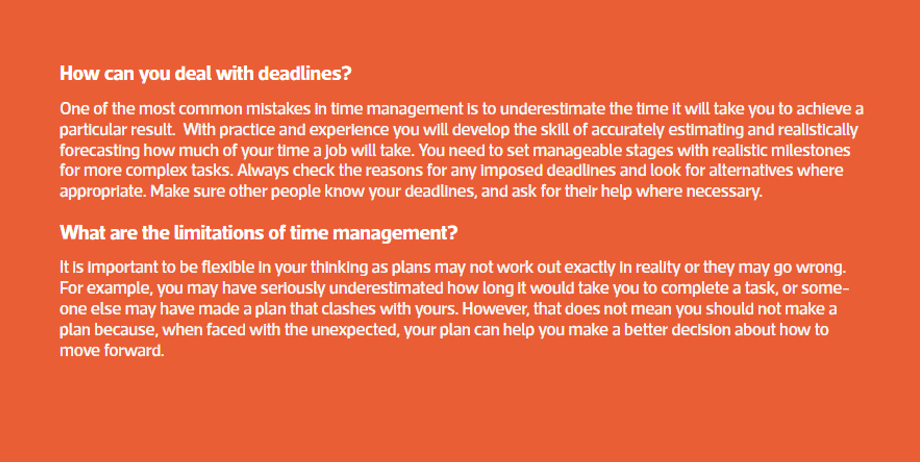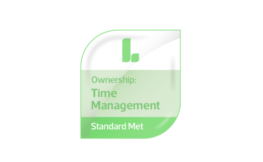"Time Management means taking more control over how you spend your time and making sensible decisions about the way that you use it." (McLachlan and Meager, 2017)
Everyone on our planet has the same number of hours in a day. How do some people appear to get so much more done? You can’t buy time, save time or stop time; you can only use it – wisely or otherwise.
Learning to take ownership over your use of time, you can:
- Improve the quality and quantity of the work you do
- Achieve your goals
- Improve the efficiency of your organisation
- Reduce stress
- Have more time to do what you want
Good time management is the process of planning the time you spend on your various tasks and activities to increase both your

A good way to improve in these is to focus.
Focus
Most of us have sat at our desks and tried to focus on a task and, despite our best intentions, find that our mind is wandering. This can impact badly on our performance. Focus means paying particular attention to certain tasks or activities. Lack of focus leads to a feeling of being out of control. It can result in situations such as:

Such situations require you to spend all of your time responding to pressing demands without thinking about, and focusing on, what you are trying to achieve. Effective focus, on specific tasks or activities, will help you and your team members to make better use of time by:
Avoiding time wasters, such as:
- Lack of priorities
- Allowing unnecessary or repeated interruptions
- Calling or attending meetings held through habit rather than necessity
- Spending time constantly fire-fighting, rather than planning effectively
- Lack of self-discipline
- Inability to say “No” to others
- Working in a disorganised way
- Doing tasks that could be delegated to others
Dealing with interruptions:
- Set aside agreed times of the day when you are available
- Limit interrupting phone calls by getting to the point straightaway
- Let people know when you are busy, perhaps by blocking off time in your electronic calendar
- Make it clear how much time you have at the start of the conversation.
- Stand up (people will not generally stay long if they see you standing and they are not invited to sit down)
- Keep your head down when the interrupter is in sight as eye contact can be misinterpreted as an invitation to engage in conversation
- Turn your computer or desk away from the entrance so that you do not face passing colleagues
Eliminating distractions by:
- Prioritising
- Setting a planned/ schedule for your work
- Removing distractions from your surroundings
- Planning for time away from your desk
- Delegating and collaborating
Prioritisation
Prioritisation refers to the process of arranging or dealing with things in order of their importance. To become a good time manager, spend some time every day thinking through your tasks and their priority. For example: What are the things you must do, because they are very important? What are the things you should do, because they are somewhat important? What are the things that it would be nice to do, though they are really not that important?
- Use your willpower to keep going on your single most important task until it is complete
- Discipline yourself to review, think through and analyse your work list every day, or week, to determine your most important task
It is said that U.S. President Dwight D. Eisenhower organised his workload and priorities according to wheth-er they were ‘Urgent’ or ‘Important’: ‘Important’ activities are directly related to the achievement of personal or work-related goals, whilst ‘Urgent’ activities demand immediate attention and are the activities we tend to con-centrate on because they are immediate, even though they may be associated with achieving someone else’s goals.
Knowing the difference between which activities are urgent and which are important allows us to plan our time to deal with important activities before they become urgent.
Regular prioritisation and awareness of the difference between urgent and important can help to ensure you avoid the biggest time waster of all – procrastination, that is, making excuses and voluntarily putting off the things you intend to do, or know that you have to do.

References
Bell, G. (2017). Time Management Skills: How to Make a To-Do List, Stop Procrastination, and Increase Your ProductivityMcLachlan, J. and Meager, K. (2017). Time Mastery – Banish Time Management Forever Publ. Panoma Press Ltd, Herts, UKThomas, M (2017). Your Team’s Time Management Problem May be a Focus Problem Harvard Business Review, issue dated Feb 27.
How well do you manage your time? Test yourself with our Scorecard.
If you’re a member, you can test yourself on your Time Management skills and see if you meet the standard.
Spotlights
Further Resources
From the blog








